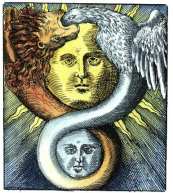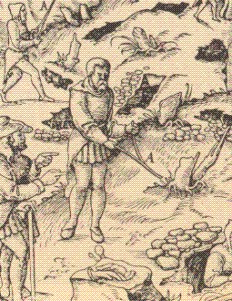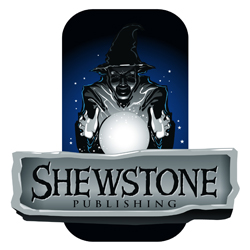Note 2018-06-05: Eldritch Realms has been renamed to Magonomia. Also, the varieties of magic have been changed somewhat as a result of playtesting, so this article no longer accurately describes Magonomia but is preserved as a development update that was accurate when it was written.
Big news today! My co-authors and I have settled on the sorts of magic that will be in the Eldritch Realms core book. Eldritch Realms is set in Renaissance England, so our priority is to include magic that one encounters in history books about the period. (If you are not familiar with Eldritch Realms yet, it's the roleplaying game of Elizabethan fantasy that we're developing -- check out the introduction).
Without further ado, here is what the rules will cover:
Alchemy

Alchemy is the magic of transforming things to a higher state: of purification, refinement, and transcendence. While alchemy employs the paraphernalia of what a modern person would call “chemistry,” in Eldritch Realms, it is definitely magic. Alchemy is capable of wondrous effects: potions of flight and of invisibility, enchanted armor and weapons, and prophecy through symbolic visions. The ultimate goal of alchemy is to transform the alchemist himself into a a physically, mentally, and spiritually superior person. Alchemy is strongest at spells of health and healing, at making various enchanted tools and weapons, and at granting people extraordinary abilities.
Astrology

The stars influence the fates of men and women, but Renaissance thinkers also strongly believed in individual free will. The predictions of astrology are therefore never perfect, but they can reveal hidden forces at work in the world or foreshadow that a seemingly unremarkable person has a great destiny. In addition to forecasting the future, a magician-astrologer knows how to imbue the power of the stars and planets into talismans that can help a person find fame, wealth, even love; and can protect against both earthly enemies and supernatural curses.
Conjuration

The world teems with invisible spirits, but whether these are angels, demons, faeries, or something else altogether, no mortal can tell. Conjuration is the science of binding and commanding these spirits and thereby harnessing their powers. Through the spirits, a conjurer can levitate into the air, scry on distant places, deflect musket-balls, or summon a tempest. Yet the spirits obey mysterious rules of their own, so every spell has a weakness that can be used to block or unravel it. A conjurer has a close relationship with a familiar spirit, who acts as the magician’s servant and sometime advisor.
Druidism

The magic of the ancient Celtic magicians known as druids still echoes throughout the British Isles. Their magic combines elements of alchemy, astrology, sigils, and conjuration into a hybrid science with a distinctive cultural identity. This is the magic of Merlin from the legend of King Arthur. It excels at shapechanging, illusion, and commanding the elements of nature.
Sigils

From the heirogylphic burial spells on ancient Egyptian scrolls, to the runes of the Anglo-Saxons and Danes who settled in early medieval England, to the theurgic inscriptions of medieval Kabbalah and Dr. John Dee’s “angelic language,” magical writing, diagrams, and glyphs have carried power in many lands and cultures. The science of sigils excels all others at creating protective wards. It is also strong at creating long-lasting blessings
Folk Magic

Magic is not just for learned experts. Practically every village in Eldritch England has a cunning-man or woman, who tells fortunes, makes charms, finds lost property, and cures sick cattle. Folk magic is a hodgepodge of weak but practical spells derived from more formal kinds of magic, imperfectly copied and then mingled with the lore of local herbs and spirits. Folk magic is too weak weak to be playable on its own (unless you like the idea of playing a more limited wizard), but it can be easily combined with any of the sciences of high magic to broaden a wizard’s powers.
